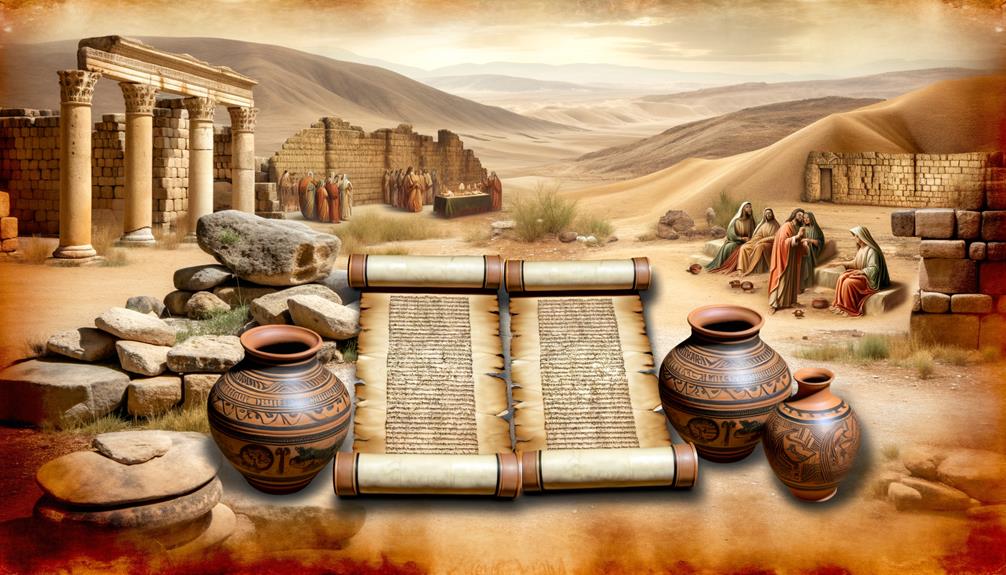288 Meaning in the Bible: Spiritual Strength
The number 288 in the Bible primarily appears in 1 Chronicles 25:7, where it refers to the organized Levitical musicians appointed by King David. This number signifies the structured and divinely orchestrated nature of worship, derived from multiplying 24 (priestly divisions) by 12 (divine governance).
It reflects the importance of order and harmony in sacred practices, highlighting the meticulous organization of praise and devotion within the temple. Examining the number 288 reveals deeper symbolic meanings of unity, spiritual completeness, and the intricacies of divine orchestration in biblical texts.
Much can be discovered in exploring the rich significance of this number.

Key Takeaways
- The number 288 in the Bible represents the total number of Levitical musicians appointed by King David, as mentioned in 1 Chronicles 25:7.
- It signifies divine orchestration and the importance of order and structure in worship practices.
- Derived from the multiplication of 24 priestly divisions and 12 divine governance, it symbolizes spiritual completeness and divine order.
- The number emphasizes themes of unity, meticulous design, and harmony in God’s creation.
Biblical Meaning of 288: Unity, Abundance, and Spiritual Renewal
| Interpretation | Meaning | Explanation |
|---|---|---|
| Partnership and Balance | The number 2 symbolizes partnership, unity, and balance, particularly with God. | In the Bible, 2 represents the importance of relationships, cooperation, and harmony between humans and God or among individuals. |
| New Beginnings and Abundance | The number 8 signifies new beginnings, renewal, and abundance. | In biblical terms, 8 is associated with fresh starts, as seen in the resurrection of Christ, symbolizing a period of renewal, spiritual growth, and abundance. |
| Double Emphasis on Abundance | The repetition of the number 8 amplifies its meaning, indicating great abundance or blessings. | Two 8s together emphasize that a powerful wave of new opportunities, growth, or blessings is coming, signifying a time of renewal and prosperity. |
| Partnership in Abundance | Represents partnerships or relationships that lead to abundant blessings. | The combination of 2 (unity) and 88 (abundance) signifies that cooperation and relationships will bring about great prosperity and renewal in your life. |
| Divine Alignment and Trust | Encourages trust in God’s plan for bringing abundance through unity and renewal. | The number 288 signifies divine alignment, encouraging you to trust that God is bringing new beginnings and abundance through partnerships and spiritual renewal. |
Occurrences of 288 in Scripture

The number 288 appears in the Bible in the context of the organization of the Levitical musicians, as detailed in 1 Chronicles 25:7.
This verse highlights the structured approach taken by King David in the appointment of skilled musicians for the service of the temple. The passage describes how 288 musicians, drawn from the families of Asaph, Heman, and Jeduthun, were meticulously chosen to perform sacred music.
This precise number underscores the importance of order and divine orchestration within worship practices. Theologically, the allocation of 288 musicians signifies a harmonious blend of talent and divine calling, reflecting the broader biblical theme of God’s purposeful design in the organization of His people.
This lends a deeper spiritual significance to the numerical detail.
Historical Context of 288

The historical context of the number 288 in the Bible can be illuminated by examining its Biblical numerical significance and ancient cultural relevance.
In scriptural numerology, numbers often carry symbolic meanings, and 288 could be interpreted through this lens.
Additionally, understanding how ancient societies perceived and utilized this number can provide deeper insights into its theological implications.
Biblical Numerical Significance
In examining the historical context of the number 288 within the Bible, it is essential to recognize how biblical numerology often imbues numbers with symbolic significance that transcends their mere quantitative value.
This particular number is remarkably mentioned in 1 Chronicles 25:7, where it signifies the total number of musicians appointed for temple service. The number 288, derived from the multiplication of 24 (a number representative of priestly divisions) and 12 (symbolizing divine governance), underscores a structured, divinely ordained order within worship.
Such numerological insights highlight a deeper, faith-based understanding of divine orchestration and sacred service. As a result, 288 embodies a confluence of divine order and spiritual harmony, reflecting the meticulous organization inherent in biblical worship practices.
Ancient Cultural Relevance
Within the ancient cultural milieu, the number 288 held significant religious connotations, particularly within the context of temple worship and the organization of sacred music.
In 1 Chronicles 25:7, the division of 288 skilled musicians into 24 groups, each comprising 12 members, underscores the structured nature of worship in ancient Israel. These musicians played a critical role in maintaining the sanctity and continuity of temple rituals.
The meticulous attention to numerical detail reflects a broader theological principle: order and harmony in worship mirror divine order. Such numerical precision in the Bible is not arbitrary but imbued with spiritual symbolism, representing completeness and divine orchestration.
This historical context enriches our understanding of how ancient societies perceived and practiced their faith.
Symbolic Interpretations of 288

Scholars and theologians often explore the symbolic interpretations of the number 288 in the Bible, seeking to uncover deeper spiritual meanings and connections to divine principles. This number can denote completeness and divine order, reflecting the intricate design of God’s creation. Its occurrences may be subtle, yet they invite contemplation and reverence.
Divine Order: 288 often symbolizes the structured and harmonious nature of God’s universe.
Spiritual Completeness: The number may represent a form of spiritual wholeness or perfection.
Biblical Symmetry: It can be seen as part of a larger numerical pattern, emphasizing balance and symmetry in divine plans.
Understanding these symbolic interpretations offers a richer appreciation of the biblical text and its divine messages.
288 in Biblical Numerology

In Biblical Numerology, the number 288 is examined for its symbolic significance within scripture, often linked to themes of spiritual completeness and divine orchestration.
By analyzing its occurrences and theological implications, scholars can glean insights into its deeper spiritual meanings.
This inquiry not only enriches our understanding of biblical text but also offers profound spiritual interpretations that resonate with faith-based perspectives. Studying the Bible in its original languages allows for a deeper exploration of cultural and historical contexts, adding layers of significance to the text. For example, translating Bible verse meanings in Tagalog can provide unique insights into the Filipino experience of faith and understanding of biblical concepts. This cross-cultural approach to biblical scholarship fosters a more inclusive and diverse interpretation of the sacred text, enriching the spiritual lives of believers around the world.
Symbolic Biblical Significance
The number 288 holds a multifaceted significance in Biblical numerology, often interpreted through its symbolic representation of spiritual completeness and divine orchestration. This number is seen as an embodiment of God’s perfect plan and the harmony inherent within His creation.
Its occurrence in biblical texts invites contemplation on the following dimensions:
- Spiritual Completeness: The number 288 is often associated with the fulfillment of divine purposes, symbolizing the wholeness of spiritual journeys.
- Divine Orchestration: This numerological value emphasizes God’s meticulous design and the intricate patterns woven into the fabric of existence.
These elements collectively underscore the profound layers of meaning embedded in this number.
Spiritual Interpretation Insights
Exploring the spiritual interpretation of the number 288 in Biblical numerology reveals profound insights into the divine blueprint and the manifestation of God’s will.
This number, often considered a multiple of 12—a number symbolizing divine government and perfection—suggests a magnified expression of God’s ordained order.
In the context of the Bible, 288 can be associated with the organization of the Levitical musicians in 1 Chronicles 25:7, where 288 skilled musicians were appointed to serve.
This specific usage underscores the importance of divinely inspired worship and structured service in the spiritual domain, reflecting God’s meticulous design for harmonious praise.
Lessons From 288

Analyzing the significance of the number 288 in the Bible reveals profound spiritual insights and lessons integral to understanding biblical numerology. This number appears in the context of the 24 courses of musicians appointed by King David, totaling 288 musicians, which underscores the themes of divine order and worship.
Key lessons derived from this number include:
- Divine Organization and Harmony: Reflects God’s structured plan for worship and community.
- Holistic Worship: Emphasizes the importance of music and devotion in spiritual life.
These lessons highlight how numbers in biblical texts are not arbitrary but are imbued with deep spiritual meaning, fostering a richer understanding of scripture.
Theological Implications of 288

Understanding the theological implications of the number 288 necessitates a deeper examination of its role in biblical contexts and its symbolic resonance within the framework of divine order and worship.
The number 288 appears in the context of temple musicians in 1 Chronicles 25:7, where it signifies completeness and structured worship.
This enumeration of musicians underscores a meticulously organized system for praise, reflecting divine harmony and the importance of orderly worship in the life of faith.
Theologically, 288 embodies the intersection of human devotion and divine orchestration, highlighting the necessity of structure in spiritual practices.
It serves as a reminder of the sacred order that underpins worship, emphasizing the integration of communal and individual dedication to God.
Modern Relevance of 288

In contemporary faith practices, the number 288 continues to symbolize the importance of structured and harmonious worship, reflecting its biblical significance in modern contexts. This number, derived from the 24 divisions of priests and their 12 representatives, serves as a metaphor for orderly and devout service to God.
By examining its current relevance, we see:
- Liturgical Organization: Many churches adopt structured worship schedules, emphasizing the importance of order.
- Community Harmony: The principle of 288 fosters unity and collective participation among congregants.
Understanding the enduring significance of 288 encourages believers to integrate these values into their daily faith experiences, ensuring a balanced and spiritually enriched life.
Conclusion
The exploration of the number 288 within biblical texts reveals a tapestry of historical context, symbolic interpretations, and numerological significance.
Such analysis illuminates theological insights and imparts timeless lessons, echoing the profound wisdom found in Scripture.
The number 288, much like the intricate patterns within Solomon’s Temple, invites deeper reflection on divine order and spiritual harmony.
This study underscores the enduring relevance of biblical numerology in contemporary faith practices and theological discourse.






